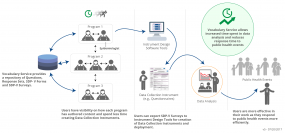SDP Vocabulary Service
Surveillance Data Platform is launching a Vocabulary Service (SDP-V) to speed disease surveillance by helping CDC more rapidly respond to data collection needs. Often data collection is done by asking a standard set of questions, collecting the responses, and using the results to update alerts, make recommendations, or implement targeted programs to protect Americans. The Vocabulary service accelerates this process by transparently sharing questions and possible responses to these questions.
The Vocabulary service provides a repository of questions, response sets, and groupings of questions (called forms and surveys), and provides visibility into which programs and surveillance systems are using this content. Vocabulary service users can search for existing content that meets their own data collection needs. This enhances consistency by reducing the number of different ways that CDC asks for similar information, lowers reporting burden on partners, and allows users to spend more time in data analysis. When needed, users are also able to author their own content, either from scratch, or using existing content as a starting point.
Using the Service: A Salmonella Example
For example, due to a multi-state outbreak, new information is needed to better understand and prevent the spread of Salmonellosis infection in people. Epidemiologists gather this information using a data collection tool. Disease detectives accelerate the creation of their data collection tool by using the Surveillance Data Platform Vocabulary service which allows them to reuse existing questions and possible answers.
The result = Technology Trims Tasks
FASTER: Data collection instrument or survey is created quickly by reusing existing questions and response sets
SMARTER: Reduced variability in data facilitates apples to apples comparisons
BETTER: Disease detectives ask consistent questions and report consistent answers, allowing multiple datasets to be compared more easily
Features And Benefits
Search and Filter to Find Existing Content Easily
Benefit: Facilitates discovery and reuse of existing vocabulary content
Leverage Expertise Across Programs and Systems
Benefit: Allows users to see which programs and systems are using which content, providing insight into the context behind content’s use, and allowing users to leverage other programs’ experience and work
Author New Content
Benefit: When no existing content meets an author’s data collection needs, the Surveillance Data Platform Vocabulary Service provides an interface for authors to create new content from scratch, or extend existing content. Extending means creating a copy of existing content to be used as a starting point for an author’s own needs.
Draft Content Privately, then Submit for Publishing when Ready
Benefit: Authors decide when their new content is ready to be submitted for Publisher review and public visibility
Export Groupings of Questions in SDP-V Forms and SDP-V Surveys
Benefit: Leverage Vocabulary service content and authoring capabilities to create a data collection specification for use in other data collection tools
Search for Codes Across Several Code Systems
Benefit: Enables authors to look up coded values from code systems such as LOINC and SNOMED for use in their response sets
Maintain Version History
Benefit: See the evolution of Vocabulary content from one published version to the next
- Page last reviewed: September 28, 2017
- Page last updated: September 28, 2017
- Content source:


 ShareCompartir
ShareCompartir

